Periodontics
6700 Crosswinds Dr N #200B, St. Petersburg, FL 33710

Wisdom Teeth
The average mouth is made to hold only 28 teeth. It can be painful when 32 teeth try to fit in a mouth that holds only 28 teeth. These four other teeth are your third molars, also known as “wisdom teeth.”
By the age of eighteen, the average adult has 32 teeth; 16 teeth on the top and 16 teeth on the bottom. Each tooth in the mouth has a specific name and function. The teeth in the front of the mouth (incisors, canine and bicuspid teeth) are ideal for grasping and biting food into smaller pieces. The back teeth or molar teeth are used to grind food up into a consistency suitable for swallowing.
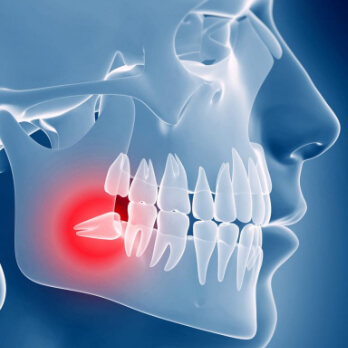
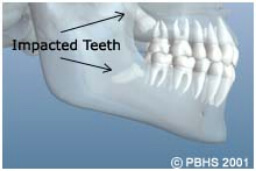
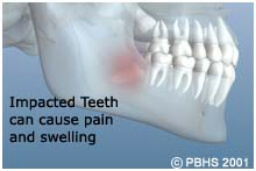
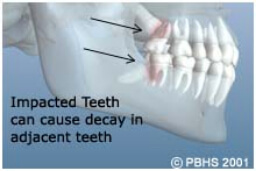
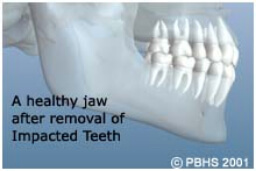
Wisdom teeth are the last teeth to erupt within the mouth. When they align properly and gum tissue is healthy, wisdom teeth do not have to be removed. Unfortunately, this does not generally happen. The extraction of wisdom teeth is necessary when they do not erupt properly into the mouth. They may grow sideways, partially emerge from the gum and even remain trapped beneath the gum and bone. These poorly positioned impacted teeth can cause many problems. When they are partially erupted, the opening around the tooth allows bacteria to grow and will eventually cause an infection or promote decay of the adjacent teeth. The result: swelling, stiffness, pain and illness.
The pressure from the erupting wisdom tooth may move other teeth and disrupt the orthodontic or natural alignment of teeth. The most serious problem occurs when tumors or cysts form around the impacted wisdom tooth, resulting in the destruction of the jawbone and healthy teeth. Removal of the offending impacted tooth or teeth usually resolves these problems. Early removal is recommended to avoid such future problems and to decrease the surgical risk involved with the procedure.
With an oral examination and x-rays of the mouth, Dr. Chuong can evaluate the position of the wisdom teeth and predict if there may be present or future problems. Studies have shown that early evaluation and treatment result in a superior outcome for the patient. Patients are generally first evaluated in the mid-teenage years by their dentist, orthodontist or by an oral and maxillofacial surgeon.
All outpatient surgery is performed under appropriate anesthesia to maximize patient comfort. Dr. Chuong has the training, license and experience to provide various types of anesthesia for patients to select the best option.
In most cases, the removal of wisdom teeth is performed under local anesthesia, with or without intravenous sedation. These options as well as the surgical risks (i.e. sensory nerve damage, sinus complications, infection, bleeding, etc.) will be discussed with you before the procedure is performed. Once the teeth are removed, the gum is sutured. To help control bleeding, bite down on the gauze placed in your mouth. You will rest under our supervision in the office until you are ready to be taken home. You will be seen for a follow up evaluation approximately one week after surgery. If you have any questions, please do not hesitate to call us at 727-894-1442.
Our services are provided in an environment of optimum safety that utilizes modern monitoring equipment and staff that are experienced in anesthesia techniques.
Call us to schedule an appointment today!
Periodontics office also speak fluent Spanish, Vietnamese, and Korean.